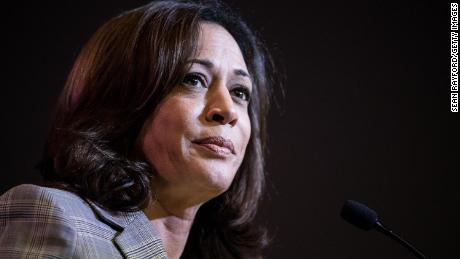(CNN)Former Vice President Joe Biden is racking up endorsements.
Since his resounding victory in the South Carolina primary, Biden has snagged over 40 endorsements from members of Congress and governors. On Monday, Sen. Cory Booker offered his support, a day after Biden's campaign announced that he secured the backing of another former rival of his in the Democratic presidential race, California Sen. Kamala Harris.
No candidate has lost when ahead in the national polls and endorsements at this point, as Biden is right now.
There have been 14 party primaries without an incumbent running since 1980. The leader in endorsements from members of Congress and governors this long after the Iowa caucuses have won 11 out of 14 of them (79%). This success rate undersells Biden because the people winning in endorsements who went on to lose were trailing in the national polls.
The even better news for Biden is that he's clearly picking up steam in the endorsement primary. Although Biden has always led in endorsements, he was "not crushing it," as I wrote in December. He had a mere 11% of the possible endorsements of Democratic governors, House members and senators, when weighting governors and senator endorsements more heavily.
Today, Biden's sitting at 28% of the possible endorsements. That's not just up significantly from December, but it's up from 15% before the South Carolina primary.
This is a clear sign that the party is rallying behind him. In fact, no candidate has picked up as many endorsements as Biden has in the last week at a comparable week in the last 14 primaries. The next closest was John McCain in 2008, who like Biden was a former front-runner who stormed back and did very well on Super Tuesday.
While Biden has generally been regarded as a "weak" front-runner, his 26% of possible endorsements is right behind the 29% that the median leader in previous primaries had at this point.
Indeed, look at the candidates who have been ahead in endorsements at this point in the primary and lost. Two were clearly in worse positions than Biden. Al Gore in 1988 had 11% of possible endorsements. Marco Rubio had 20%.
The only one who was doing better in the endorsement primary than Biden and lost was Hillary Clinton in 2008. She had 33% of possible endorsements. Clinton, though, had lost her polling lead after Super Tuesday. Biden's up double-digits in the average of national polls right now.
Further, Barack Obama was more than acceptable to elected officials. He was at 21% of possible endorsements.
Vermont Sen. Bernie Sanders, on the other hand, has very little support from his fellow elected officials. He has just 2% of the possible endorsements, 26 points behind Biden.
No candidate has ever come back to win a primary when facing a 24 point deficit in possible endorsements at this point.
Tellingly, Sanders didn't pick up a single endorsement from members of Congress or governors after his dominating Nevada victory. There was a real resistance to his candidacy. Even Donald Trump, who the establishment hated, had 4% of possible endorsements at this point in the 2016 presidential race.
Trump, of course, had the added advantage of having a clear plurality of the voters behind him in the polls and in the votes. He didn't need to worry that the party wasn't behind him.
Sanders will somehow need to do better in future primaries with a party establishment that wants nothing to do with him. It's a very tall order.
This story has been updated to reflect Booker's endorsement.


















